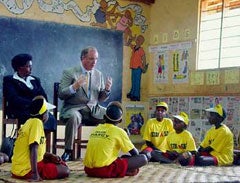What You Need to Know
Stop the Export of U.S.-Funded Abstinence-Only HIV/AIDS Programs
What are abstinence-only HIV/AIDS programs?Abstinence-only programs (also known as abstinence-until-marriage programs) teach young people that abstaining from sex until marriage is the only way to prevent sexual transmission of human immunodeficiency virus (HIV), the virus that causes acquired immune deficiency syndrome (AIDS). These programs withhold or distort information about any other HIV-prevention strategy besides abstinence, including safer sex and the use of condoms. They ignore the risk of HIV transmission within marital relationships and fail to provide information so that couples can protect themselves.
Where are abstinence-only programs being sent?
Abstinence-only programs are the main youth HIV-prevention strategy under U.S.
President George W. Bush’s Emergency Plan for AIDS Relief (PEPFAR).
While these programs could be sent to any country where the U.S. funds HIV-prevention,
to date the U.S. has recommended sixteen “focus countries” to
which most PEPFAR money will go. These are Botswana, Cote d’Ivoire,
Ethiopia, Guyana, Haiti, India, Kenya, Mozambique, Namibia, Nigeria, Rwanda,
South Africa, Tanzania, Uganda, Vietnam, and Zambia.
How much is the U.S. spending on these programs?
The legislation authorizing PEPFAR, the United States AIDS, Tuberculosis and
Malaria Act (2003), requires that at least 33 percent of all spending on
HIV-prevention go to “abstinence-until-marriage” programs. The
act authorizes the expenditure of U.S. $15 billion over five years, of which
20 percent (U.S. $3 billion) can be spent on prevention. If one-third of
this prevention budget goes to abstinence-until-marriage programs, that would
equal U.S. $1 billion spent on these programs over five years.
What is wrong with abstinence-only programs?
Abstaining from sex until marriage is one of many healthy choices young people
can make. But abstinence-only programs withhold or distort information about
any method of HIV prevention other than abstinence, and even discourage young
people from using condoms by exaggerating their (very low) failure rates
or saying that they don’t work at all. These programs have been proven
less effective at lowering young people’s HIV risk than programs that
combine abstinence messages with information about condoms and safer sex.
They also discriminate against lesbian, gay, bisexual, and transgender youth,
who cannot legally marry in most countries, by teaching that there is no
safe way for them to have sex.
Doesn’t the U.S. support an ‘ABC’ approach to HIV
prevention?
The U.S. often describes its global HIV-prevention strategy with the acronym ‘ABC,’ which
stands for Abstain until marriage, Be faithful, and use Condoms. In fact, the
five-year strategy for PEPFAR breaks this down into Abstinence for unmarried
young people, Being faithful for married people, and Condoms for “high
risk” persons such as sex workers and people living with AIDS. Thus,
for unmarried young people the U.S. strategy is abstinence-only, not ABC. In
a recent investigation in Uganda, Human Rights Watch found that young people
were being denied information about condoms and safer sex because of the increasing
U.S. focus on “abstinence-only.”
What can I do to stop the export of abstinence-only programs?
Young people around the world have a human right to know about all effective
methods of HIV-prevention, not just abstinence. Here's what
you can do.
Join Human Rights Watch: Help us pressure the United
States and other governments to stop funding abstinence-only programs and
to replace them
with programs that provide kids with complete HIV/AIDS information. Join
us today.

Get Informed
Facts at a GlanceFull Report: The Less They Know, the Better—Abstinence-Only HIV/AIDS Programs in Uganda
Press Release
More on HIV/AIDS and Human Rights
In Images
Pages from Ugandan TextbooksAudio
Human Rights Watch Researcher Tony Tate on U.S.-Funded, Abstinence-Only HIV/AIDS Programs in UgandaGet Involved
What You Can DoWrite to Your Legislator
Write to President Bush and Ambassador Tobias
